What is Discovery ABA?
Unlock the meaning and benefits of Discovery ABA! Demystify misconceptions and explore this impactful approach.

Introduction to Discovery ABA
When it comes to helping individuals with developmental disabilities, Applied Behavior Analysis (ABA) has proven to be an effective approach. Within the realm of ABA, there is a specific methodology known as Discovery ABA. In this section, we will define Discovery ABA and explore its history and evolution.
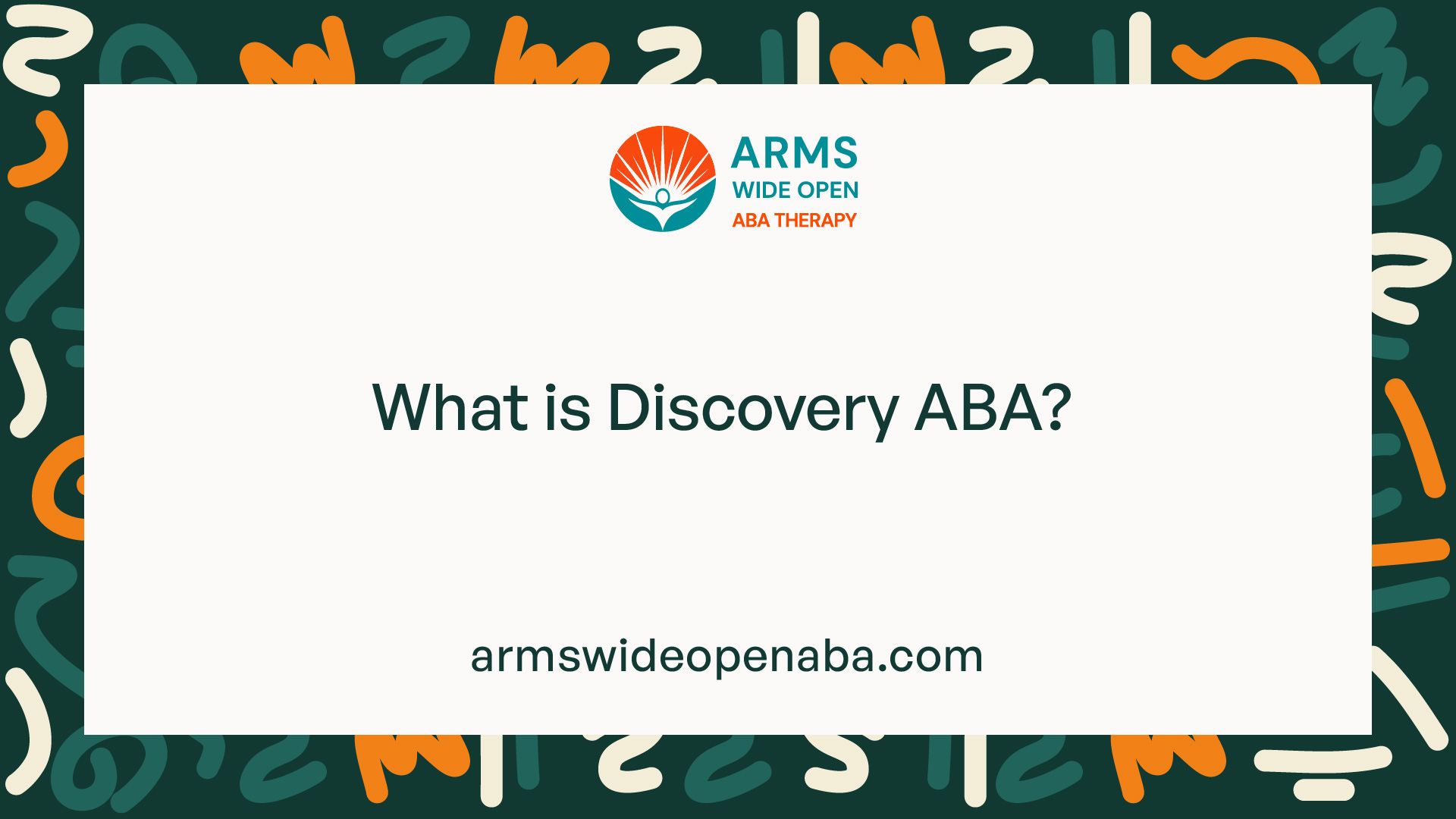
Defining Discovery ABA
Discovery ABA is an individualized approach within the field of Applied Behavior Analysis that focuses on promoting independence, functional skills, and meaningful engagement in the natural environment for individuals with developmental disabilities. It emphasizes the importance of identifying and building upon an individual's strengths and interests to enhance their overall quality of life.
The key principle of Discovery ABA is that learning and skill acquisition occur best in natural, everyday environments rather than in isolated or contrived settings. By utilizing this approach, individuals have the opportunity to apply their skills in real-life situations, leading to greater generalization and transferability of those skills.
Discovery ABA recognizes that each person is unique and has their own set of abilities and preferences. Therefore, the interventions and strategies employed are tailored to meet the specific needs and goals of the individual. This person-centered approach ensures that the individual remains at the forefront of the decision-making process.
History and Evolution of Discovery ABA
The concept of Discovery ABA emerged as a response to the limitations of traditional ABA interventions, which often focused on rote learning and discrete trial training. The pioneers of Discovery ABA sought to provide a more holistic and inclusive approach to intervention.
Over time, the approach has evolved and incorporated various evidence-based strategies and techniques from other disciplines such as occupational therapy, speech therapy, and special education. This integration has further enhanced the effectiveness of Discovery ABA in promoting functional skills and independence.
The evolution of Discovery ABA has been driven by ongoing research, advancements in technology, and a growing understanding of the complex needs and abilities of individuals with developmental disabilities. This dynamic field continues to adapt and refine its practices to ensure the best possible outcomes for individuals receiving Discovery ABA interventions.
As we delve deeper into the principles and benefits of Discovery ABA, we will gain a better understanding of how this approach can positively impact the lives of individuals with developmental disabilities.
Principles of Discovery ABA
Discovery ABA is rooted in several core principles that guide its implementation and effectiveness. These principles emphasize an individualized approach, natural environment, and focus on functional skills.
Individualized Approach
At the heart of Discovery ABA is the recognition that each individual is unique and requires an individualized approach to their learning and development. This principle emphasizes the importance of tailoring interventions and strategies to meet the specific needs of the individual. By understanding and considering the strengths, preferences, and challenges of the individual, professionals can design personalized programs that maximize their potential for growth and progress.
Natural Environment
Discovery ABA takes place in the natural environment of the individual, such as their home, school, or community settings. This principle recognizes that learning is most effective when it occurs in contexts that are relevant and meaningful to the individual's daily life. By utilizing natural environments, individuals have the opportunity to practice and generalize their skills in real-life situations, leading to a higher likelihood of successful outcomes.
To illustrate the significance of the natural environment in Discovery ABA, consider the following example:

Functional Skills
The focus of Discovery ABA is on teaching functional skills that are relevant and meaningful to the individual's daily life. Functional skills are those that enable individuals to participate in activities, engage with others, and achieve a greater level of independence. By targeting these skills, individuals can enhance their ability to navigate their environment, interact with others, and accomplish tasks that are important to them.
To further understand the emphasis on functional skills in Discovery ABA, consider the following example:

By adhering to the principles of an individualized approach, natural environment, and functional skills, Discovery ABA provides a framework for effective and personalized intervention. These principles contribute to the overall success of the approach, enabling individuals to achieve their full potential and lead fulfilling lives.
Benefits of Discovery ABA
When it comes to Applied Behavior Analysis (ABA), the approach known as Discovery ABA offers a range of benefits for individuals. By focusing on individualized strategies and natural environments, Discovery ABA aims to provide effective support and promote meaningful outcomes. Let's explore some of the key benefits of Discovery ABA.
Improved Social Interaction
Discovery ABA places a strong emphasis on improving social interaction skills. Through targeted interventions and tailored strategies, individuals are encouraged to develop and enhance their social abilities. This includes skills such as initiating conversations, maintaining eye contact, taking turns, and understanding social cues. By improving social interaction, individuals can experience increased confidence and better engage with others in various social settings.
Enhanced Communication Skills
Communication plays a vital role in our daily lives, and Discovery ABA recognizes the importance of fostering effective communication skills. By utilizing evidence-based techniques, therapists work with individuals to develop their communication abilities. This may involve using augmentative and alternative communication (AAC) systems, such as picture exchange communication systems (PECS) or speech-generating devices. Through consistent practice and reinforcement, individuals can improve their expressive and receptive communication skills, leading to enhanced overall communication abilities.
Greater Independence
One of the primary goals of Discovery ABA is to promote greater independence in individuals. Through a combination of functional skill development and a focus on individual strengths, individuals can gain the necessary skills to navigate various aspects of their daily lives more independently. This may include activities such as self-care routines, household tasks, community navigation, and vocational skills. By fostering independence, Discovery ABA empowers individuals to lead more fulfilling lives and participate actively in their communities.
It's important to note that the benefits of Discovery ABA can vary depending on the individual and their specific needs. A comprehensive assessment and ongoing monitoring of progress are essential to ensure that interventions are tailored to each individual's unique requirements. By focusing on improved social interaction, enhanced communication skills, and greater independence, Discovery ABA offers individuals the opportunity to thrive and reach their full potential.
Implementing Discovery ABA
Implementing Discovery ABA involves several key components to ensure the successful application of this approach. These components include assessment and goal setting, strategies and techniques, and monitoring progress.
Assessment and Goal Setting
The first step in implementing Discovery ABA is conducting a comprehensive assessment to gain a thorough understanding of the individual's strengths, areas of need, and goals. This assessment may involve direct observations, interviews with caregivers and teachers, and standardized assessments. The information gathered during the assessment helps to identify specific target areas for intervention and establish meaningful goals.
During the goal-setting process, it is important to prioritize individualized goals that are relevant to the person's unique needs and circumstances. These goals should be specific, measurable, achievable, relevant, and time-bound (SMART). By setting clear and realistic goals, the Discovery ABA team can work towards promoting the individual's development and independence.
Strategies and Techniques
Once the goals are established, the next step is to determine the strategies and techniques that will be used to facilitate skill development. Discovery ABA employs a variety of evidence-based practices tailored to the individual's needs. These practices may include:
- Naturalistic Teaching Strategies: This approach emphasizes teaching skills within the individual's natural environment, using their interests and motivations as a catalyst for learning. It encourages active engagement and promotes generalization of skills across different settings.
- Prompting and Reinforcement: Prompts are used to guide the individual's behavior towards the desired response. These prompts can be gradually faded over time as the individual becomes more proficient in the targeted skill. Reinforcement, in the form of praise, rewards, or preferred activities, is provided to strengthen and maintain desired behaviors.
- Task Analysis: Complex skills are broken down into smaller, manageable steps, allowing the individual to learn each step before progressing to the next. This systematic approach enables the individual to acquire new skills more effectively.
Monitoring Progress
Regular and ongoing monitoring of progress is a vital aspect of Discovery ABA. This involves collecting data to objectively measure the individual's performance and track their progress towards the established goals. The data collected may include the frequency, duration, or accuracy of specific behaviors or skills.
By analyzing the data, the Discovery ABA team can evaluate the effectiveness of the intervention strategies and make any necessary adjustments. This process ensures that the individual's goals are being met and allows for continuous refinement of the intervention plan.
Monitoring progress also involves regular communication and collaboration with the individual's caregivers and other professionals involved in their care. This collaborative approach fosters consistency and maximizes the individual's progress across different environments.
Implementing Discovery ABA requires a systematic and individualized approach, incorporating assessment and goal setting, strategies and techniques, and monitoring progress. By following these steps, individuals can receive the targeted support they need to develop essential skills, enhance their independence, and reach their full potential.
Misconceptions About Discovery ABA
Despite the numerous benefits and effectiveness of Discovery ABA, there are several misconceptions surrounding this approach. It's important to address these common myths and clarify any misunderstandings to provide a more accurate understanding of Discovery ABA.
Addressing Common Myths
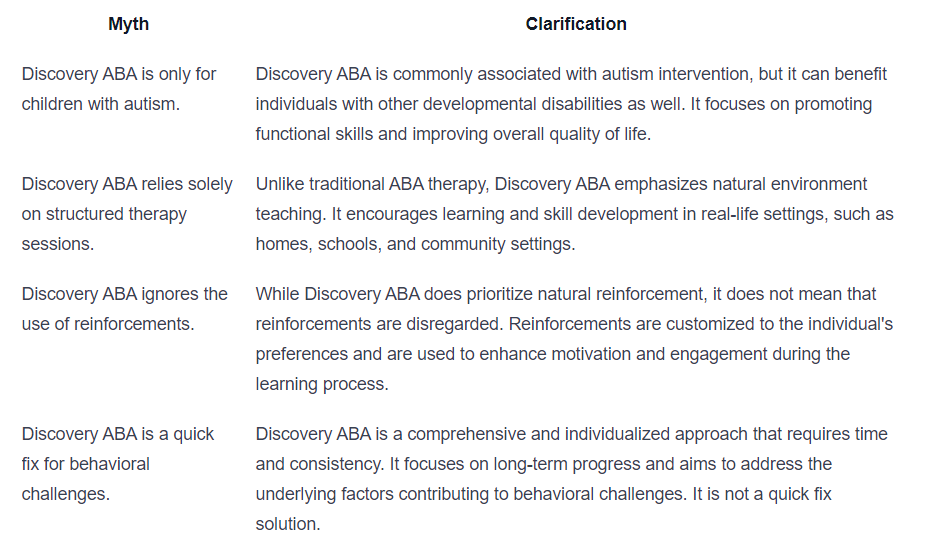
Clarifying Misunderstandings
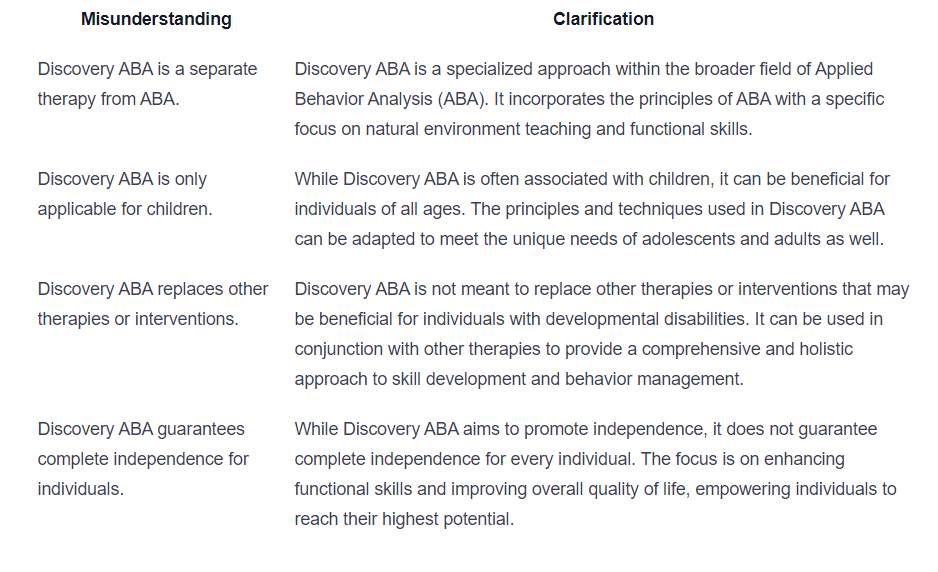
By addressing these common myths and clarifying misunderstandings, a more accurate understanding of Discovery ABA can be achieved. It is important to recognize the individualized nature of this approach and its potential to bring about positive outcomes for individuals with developmental disabilities.
Misconceptions About Discovery ABA
While Discovery ABA (Applied Behavior Analysis) is gaining recognition as an effective intervention for individuals with developmental disabilities, there are still some misconceptions surrounding this approach. Addressing these common myths and clarifying misunderstandings can help promote a better understanding of Discovery ABA.
Addressing Common Myths
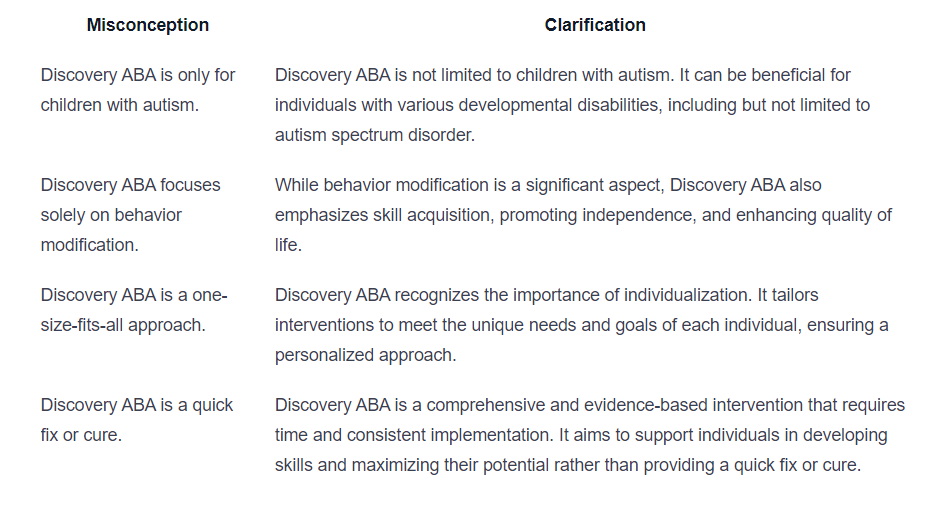
Clarifying Misunderstandings
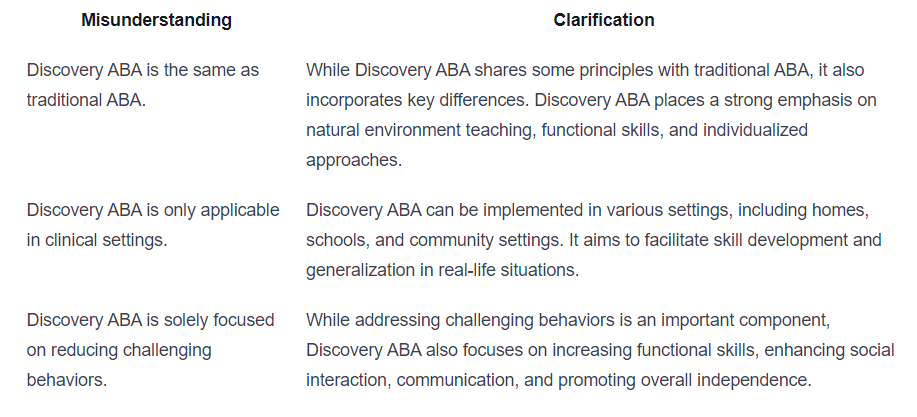
By addressing these misconceptions and clarifying misunderstandings, a more accurate understanding of Discovery ABA can be achieved. It is essential to recognize the individualized nature of this approach and its potential to positively impact the lives of individuals with developmental disabilities beyond behavior modification.
Sources
https://www.discoveryaba.com/about-us
https://www.astraaba.com/blog/what-is-discovery-aba
Similar articles
We’re here to help you

Our team is here to assist you in this process. Contact us for any assistance.
it’s easy to apply
We Accept Most Insurances
Our in-network insurance partnerships make ABA therapy more accessible to families throughout our service areas.







Our Insurance Process
We'll request your insurance details to help us verify your plan's coverage for ABA therapy. Once we've received this information, we'll walk you through your benefits, including copayments, deductibles and out-of-pocket maximums, so you know what to expect in advance.
Our team will then handle the preauthorization and all the necessary paperwork.
.svg)





















.jpeg)


































.jpeg)




.jpeg)







.jpeg)










.jpeg)
















